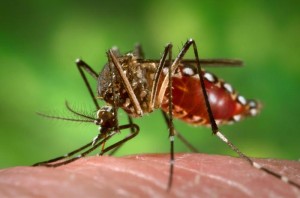Fig: Aedes aegypti mosquito
What are the symptoms of Dengue fever?
Most of the times infection with Dengue virus may not produce any symptoms or mild symptoms. They usually present like any other viral fever and improves on its own. However some of them can present with the severe form of illness, can become very unwell and need prompt medical treatment and may need admission to the Intensive care unit.
According to traditional WHO classification there are three types of Dengue fever based on clinical presentation –
1.Classical Dengue Fever
2.Dengue Hemorrhagic Fever (DHF)
3.Dengue Shock Syndrome (DSS)
How to differentiate between the different types of Dengue fever?
- Classical (Simple) Dengue Fever:
- Sudden onset of high fever.
- Severe Headache,
- Body aches due to muscles and joint pain.
- Pain behind the eyeballs
- Extreme weakness, loss of appetite, feeling of nausea.
- Pain in abdomen(Tummy/Stomach).
- Pinkish red rash on the skin
The patients can have one or more of the above symptoms and the entire duration of Classical Dengue fever last for about 5-7 days and then the patient recover.
- Dengue Hemorrhagic Fever – (DHF)
In addition to the symptoms listed under classical Dengue fever, patients with Dengue Hemorrhagic Fever (DHF), develop Bleeding from nose, gums, blood in the stools or in vomiting, bleeding spots on the skin which are seen as dark bluish-black patches.
- Dengue Shock Syndrome (DSS)
All symptoms as mentioned above in DHF are present plus the patient develops symptoms due to failure in the blood circulation (Shock), which may manifest as Restlessness and the extremities may feels cold despite high fever and the pulse may feel weak and the blood pressure will be low. The patient may loose his consciousness.
What is the usual course of dengue fever?
Dengue fever has an unpredictable course. Most patient have a febrile phase lasting for 2-7 days. This is followed by a critical phase, which is of about 2- 3 days. During this phase the patient is afebrile, and is at risk of developing Dengue Hemorrhagic fever (DHF) or Dengue shock syndrome (DSS), which may prove fatal, if prompt and appropriate treatment is not provided. After this critical phase of 2- 3 days comes the convalescent phase (Recovery phase).
What is the treatment for Dengue?
For classical Dengue Fever, the patient can be managed at Home and it is purely supportive
- Keep the fever low by giving paracetamol
- Avoid pain killers like Aspirin or brufen
- Give plenty of fluids.
- Continue normal feeding and take rest.
If the child is not improving or any of the symptoms indicative of DHF or DSS develop, consult with your doctor urgently to initiate appropriate investigations and treatment instituted, e.g., transfusion of IV fluids or platelets
How can Dengue fever prevented?
- Aedes mosquitoes breed only in stagnant water like water collected in broken bottles, old discarded tyres, coconut shell etc . So don’t allow water to remain stagnant in and around your house.
- Prevent entry of mosquitoes into the house by keeping wire mesh on windows and doors.
- Use mosquito repellents, creams
- Wear clothes which cover the body
- Keep the surroundings of your house clean.
Aedes mosquitoes bite even during daytime and hence precautions should be made against their bite during daytime also.
Author: Dr. S. Boopathi

